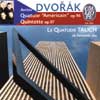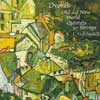Dvorák String Quintets
Warmth and rhythmic vitality from the Talich; a more studied, attenuated style of playing from L’Archibudelli
View record and artist detailsRecord and Artist Details
Composer or Director: Antonín Dvořák
Genre:
Chamber
Label: Calliope
Magazine Review Date: 3/2003
Media Format: CD or Download
Media Runtime: 59
Mastering:
Stereo
DDD
Catalogue Number: CAL9331

Tracks:
| Composition | Artist Credit |
|---|---|
| String Quartet No. 12, 'American' |
Antonín Dvořák, Composer
Antonín Dvořák, Composer Talich Quartet |
| String Quintet, 'American' |
Antonín Dvořák, Composer
Antonín Dvořák, Composer Jirí Zigmund, Viola Talich Quartet |
Composer or Director: Antonín Dvořák
Genre:
Chamber
Label: Vivarte
Magazine Review Date: 3/2003
Media Format: CD or Download
Media Runtime: 71
Mastering:
Stereo
DDD
Catalogue Number: SK89605

Tracks:
| Composition | Artist Credit |
|---|---|
| String Quintet |
Antonín Dvořák, Composer
(L')Archibudelli Antonín Dvořák, Composer |
| String Quintet, 'American' |
Antonín Dvořák, Composer
(L')Archibudelli Antonín Dvořák, Composer |
| Nocturne |
Antonín Dvořák, Composer
(L')Archibudelli Antonín Dvořák, Composer |
Author: Rob Cowan
Considered as playing per se, L’Archibudelli is extremely accomplished: limpid, urbane, stylishly tailored and with a refined profile that falls gently on the ear. However, two key ingredients seem to me conspicuous by their absence: colour and a willingness to let the music dance. Neither am I entirely sure about the appropriateness of L’Archibudelli’s playing style. Happily, in the case of Dvorák, those who wish to check out period performances have access to a precious roster of recordings made by ensembles that were formed during the composer’s lifetime. I’m thinking of early electrical recordings of the American Quartet by the Bohemian Quartet (Biddulph) and the
L’Archibudelli are at their best in the sun-drenched B49 Quintet (with double bass) though the opening Allegro is a little too amiable for the prescribed con fuoco. The Nocturne (included here as an extra; Dvorák later dropped it from the parent work) is less then rapturous than it might have been, especially from 2'53" when the music gains both in intensity and tempo. The Talich in their second American Quartet for Calliope lean towards a common tonal centre, the second violin and viola providing – in the Largo – a warm but urgent setting for the lead violin’s principal theme. No lack of alertness either, notably in the last two movements. I retain a fondness for the more earnest 1963 Decca recording by the Janácek Quartet (reviewed on page 59) while in the finale no one in my experience quite matches the Amadeus Quartet for rhythmic bounce.
The Talich’s B180 Quintet (with second viola) has all the sparkle and rhythmic lift that L’Archibudelli lacks, the first movement irrepressibly high-spirited (L’Archibudelli sound almost blasé), the Dumka-style poco andante abundantly rich in contrasts. L’Archibudelli are strong on subtleties of texture, underlining this or that specific sonority, and Wolf Erichson’s production delivers a beautifully judged recording, but their idiom seems ill-fitting. By contrast, the Talich provides an ideal pairing for the American Quartet and Quintet, very well engineered. Then again, budget-conscious collectors might like to consider the Keller Quartet’s excellent Erato coupling (with violist Anna Deeva), now out as a budget-price Apex CD, marginally swifter throughout than the Talich though not quite as personal nor as characterful. And there are The Lindsays on ASV, B179 and B180 being part of their four-CD Dvorák chamber music survey, vital, warm-hearted (effective portamenti in the American’s Largo) and full of burning enthusiasm. If, however, B49 is your leading priority, I would recommend the Lincoln Center Chamber Music Society on Delos, bristling with life in every bar – and beautifully recorded.
Discover the world's largest classical music catalogue with Presto Music.

Gramophone Digital Club
- Digital Edition
- Digital Archive
- Reviews Database
- Full website access
From £8.75 / month
Subscribe
Gramophone Full Club
- Print Edition
- Digital Edition
- Digital Archive
- Reviews Database
- Full website access
From £11.00 / month
Subscribe
If you are a library, university or other organisation that would be interested in an institutional subscription to Gramophone please click here for further information.




